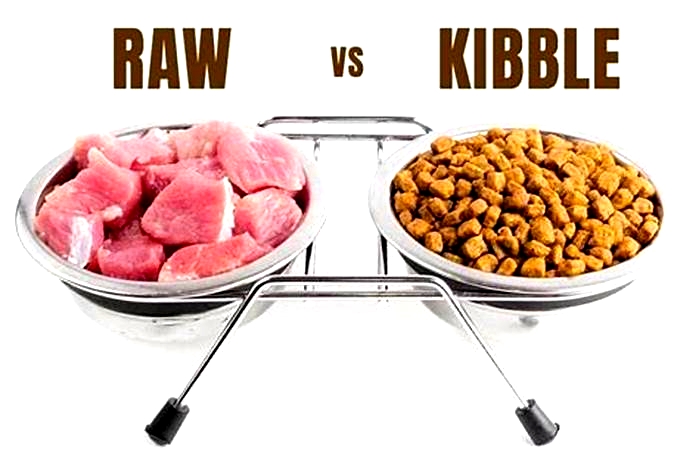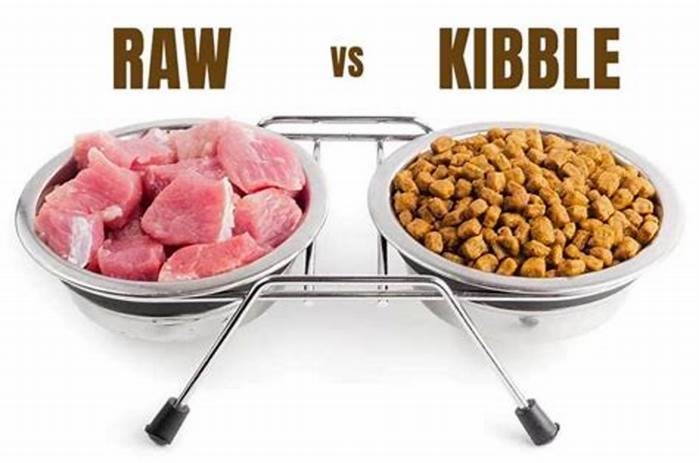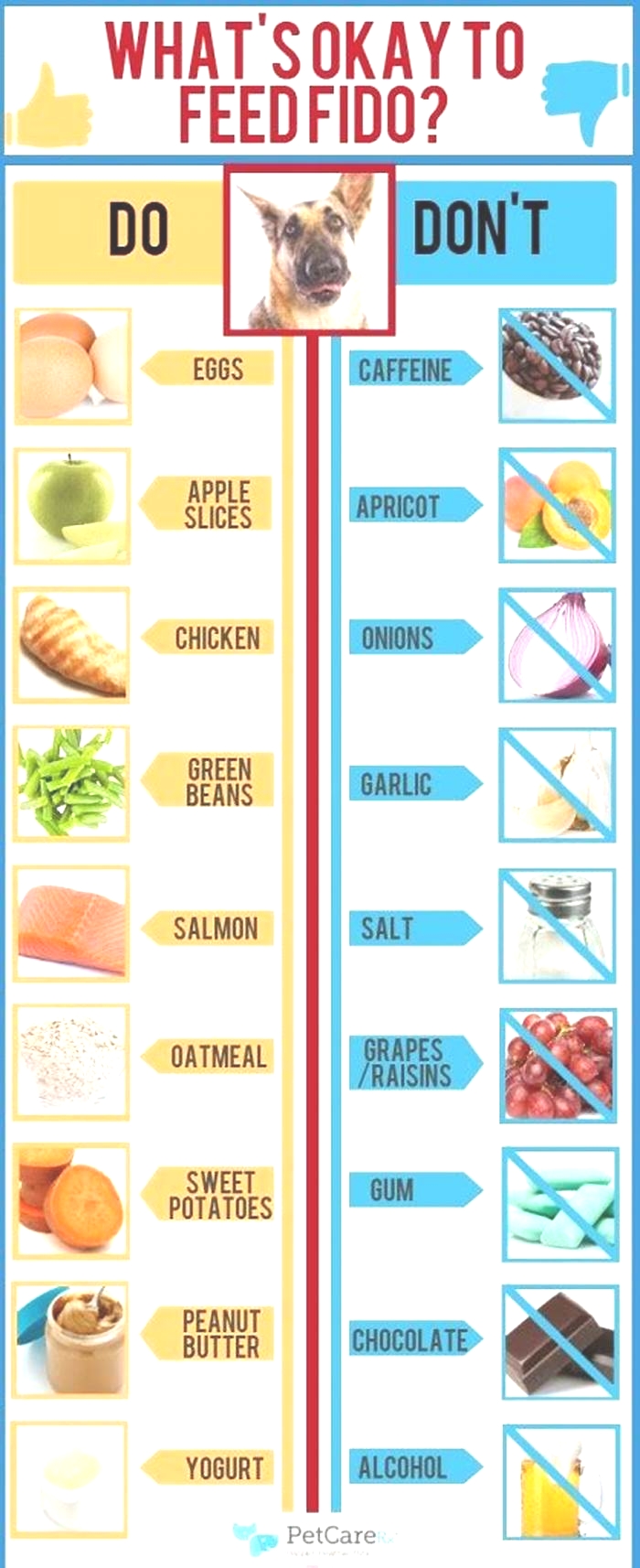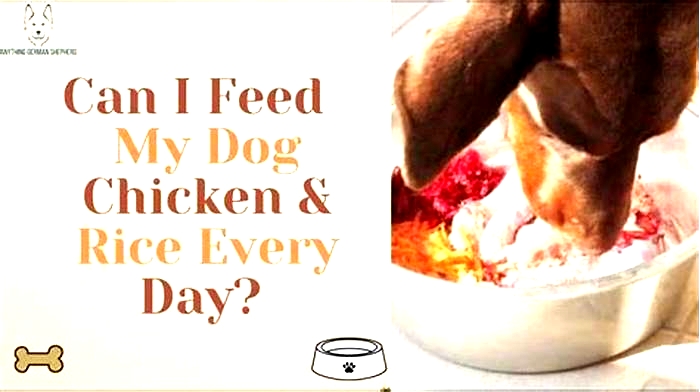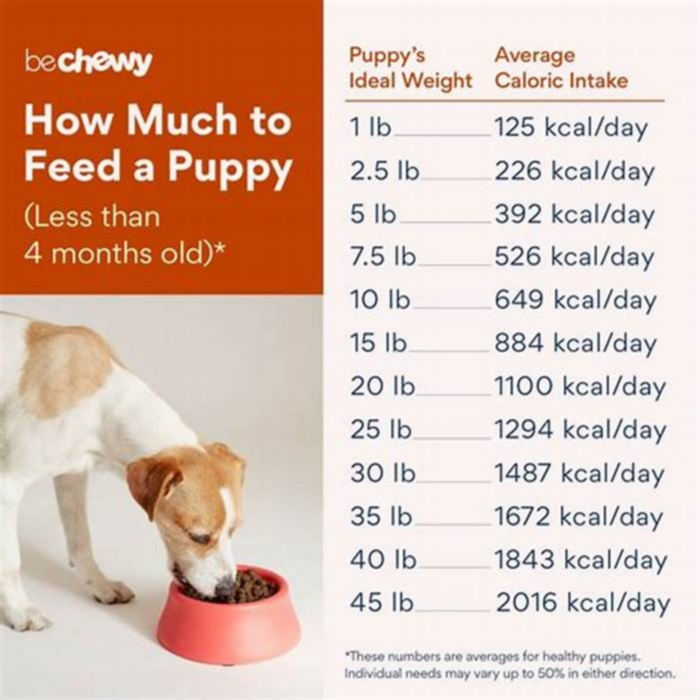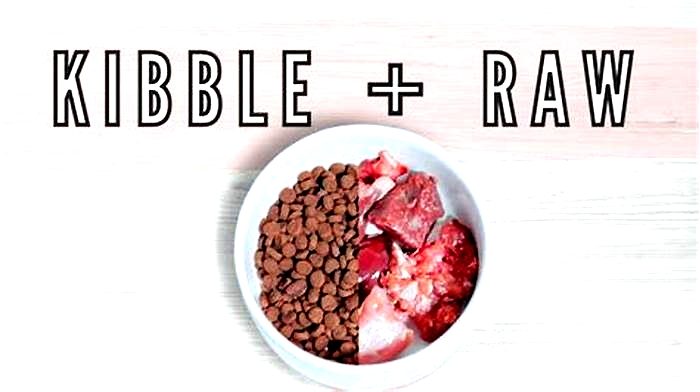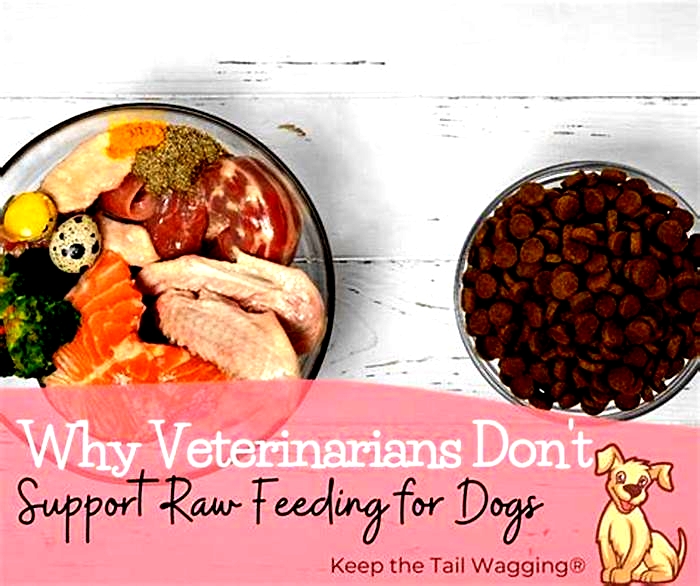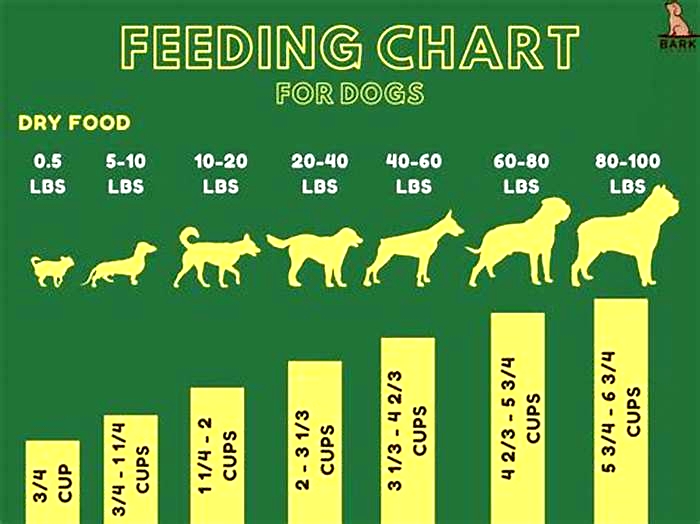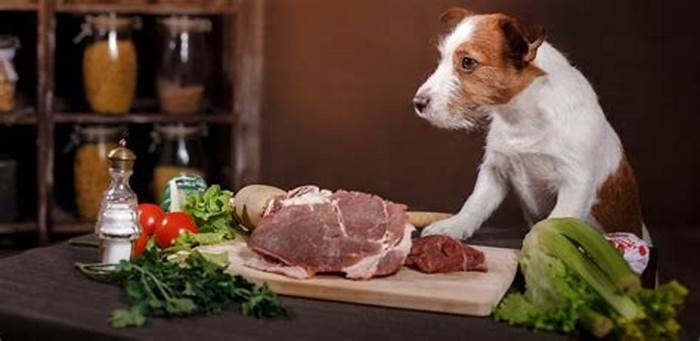Why you shouldn t feed kibble
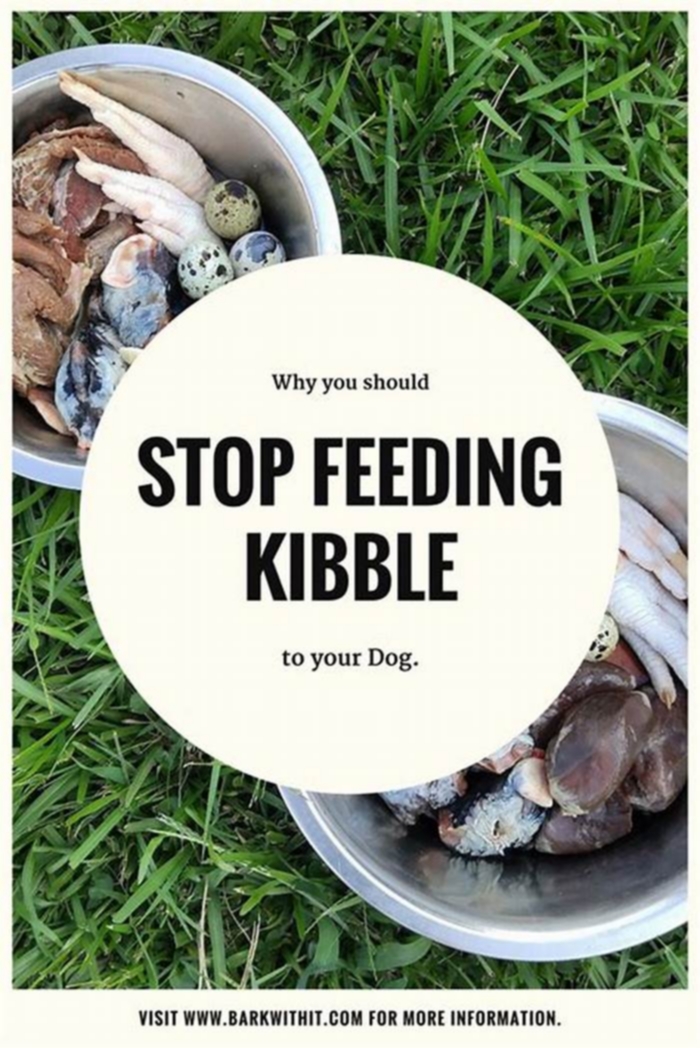
Why you shouldnt feed kibble to a Cat
The fundamental reason you shouldnt
feed kibble to a cat.
Weve all been there havent we? Stuck in the aisle of the pet food store trying to choose the best quality food for our furry felines. They sleep there on the couch all day looking for all the world like an angelic fluffy cushion, but at dinner time (or 5am breakfast time) the inner hunter emerges and they demand what they want. And if we dont have their ideal meal planned that day, they let us know about it.

So here we are again, staring at rows upon rows of meals for cats,. Trying desperately to reconcile the taste demands of our Lord and Master with our desire to feed them food that will keep them well. Being influenced by our budget, and that nagging doubt youll never find the best food anyway. Does it even exist?
Well Im here to tell you that if you are looking on the shelves of the pet food store, then no. You are not going to find the best food.
Because we all intrinsically know that good quality, fresh and wholesome food is not found in a bag or a can in the long-life storage area of the store. Real food goes off. Fresh food needs to be chilled or frozen. Fresh food is not convenient.
Why do cats need fresh food?

Our furry feline friends are highly evolved as master hunters. They are obligate carnivores who are so successful in their hunting prowess that they have discarded all other nutritional adaptive measures that would mean they can eat a varied diet. They are finely tuned to eat a diet consisting of small animals, several times per day. These might be mice, rats, lizards, rabbits, frogs, insects and birds and yes, they do eat the gut contents of small prey. They do not eat vegetables, grains or grass.
This evolutionary elitism means that cats are designed to eat raw diets, raw meat, organs, bones, skin and feathers.
Unlike dogs who have adapted to living with humans and eating their food, cats have done the opposite. They have adapted humans to live with them and to serve them in this life. They tolerate our very existence merely because we can procure food for them. And we love them more and more because of it!!

Convenience based kibble diets are so far removed from the natural diet of the cat that they are actually not recognised by the cat as food. These foods need chemical additives, called palatants, to make this food appear edible. Pyrophosphates (cat crack) are chemicals that are sprayed onto the surface of cat kibble to encourage them to eat the stuff. This chemical is so addictive that when cats get hooked on it. They crave it more and more looking for all the world like they are enjoying their food! Unfortunately predisposing them to obesity, diabetes and inflammatory diseases.
Have a read of this white paper from AFB International on The Chemistry of Kibble. It is well worth the read. (This information is freely available on their website).
Bentons Road Vet combining Natural Health & Modern Medicine
Why You ShouldnT Feed Your Dog Rice (Feed This Instead!)

 Rice Rice is a food that is commonly seen in the dog food industry, but did you know that if fed long term, it can cause health problems? I personally love rice; its the only carb I probably wouldnt be able to give up, but is it a food source that is beneficial for dogs? In this article, Ill be going over rice as an ingredient in commercial and homemade dog food, as well as research and studies that go over the effects rice has on dogs bodies and what you should feed instead. Rice is a grain that is mostly made up of carbohydrates and is often found as a main ingredient on the back of kibble packaging. Commercial brands often claim that rice provides energy as well as protein for your dog, but the real reason why its a main ingredient in commercial diets is because carbohydrates are essential to give kibble structure. Additionally, its a much more economical energy source than fat and protein.
Rice Rice is a food that is commonly seen in the dog food industry, but did you know that if fed long term, it can cause health problems? I personally love rice; its the only carb I probably wouldnt be able to give up, but is it a food source that is beneficial for dogs? In this article, Ill be going over rice as an ingredient in commercial and homemade dog food, as well as research and studies that go over the effects rice has on dogs bodies and what you should feed instead. Rice is a grain that is mostly made up of carbohydrates and is often found as a main ingredient on the back of kibble packaging. Commercial brands often claim that rice provides energy as well as protein for your dog, but the real reason why its a main ingredient in commercial diets is because carbohydrates are essential to give kibble structure. Additionally, its a much more economical energy source than fat and protein.
Basically, its cheap and easy. Rice is a common base in home-cooked meals as well. The idea behind many home-cooked meals is to provide the ingredients that commercial food includes, but should you really be following the ingredient list of commercial food in its fresh whole state? Rice is also the first suggestion for diarrhea because its bland and contains elements that absorb water passing through the GI tract; essentially, it stops the diarrhea but doesnt treat the root cause. Okay, so Ive made a lot of claims, but where is the evidence to back this up?


Is brown or white rice better for dogs with upset stomach?
White rice White rice is lower in nutritional value than brown rice, but its blandness makes it more suitable for upset stomachs. Oils, butter, and added seasonings can irritate your dogs stomach and make the problem worse, so stick with plain boiled chicken and rice and save the extra stuff for your own meal.
Source: https://www.akc.org/expert-advice/nutrition/six-foods-to-feed-your-dog-when-hes-sick/
Lets look at this in terms of numbers. Should 100 grams of cooked white rice really be a major protein source when it comes to energy? Dogs rely on fat over carbohydrates because fat is essential for nutrient absorption, transportation, and is their ideal source of energy. The energy from carbohydrates comes from the sugar created after their body has metabolized it. White rice ranks very high on the glycemic index.
This index rates how quickly and how high the food source causes the blood sugar levels to spike after consumption. The index assigns a number between 0 and 100, with 50 grams of pure glucose receiving a rating of 100. What number is white rice assigned? 72, with only a few other starchy foods like white bread, potatoes, and cornflakes being higher than that. So when your dog consumes carbohydrates like rice, it metabolizes them into sugar, causing their blood sugar to spike, which then can lead to diabetes and weight gain. This brings us to inflammation. high glycemic index Carbs also trigger the body to produce a chronic inflammation response.
Studies have reported the mechanism by which high-GI diets induce inflammation by stating that high-GI diets induce hyperglycemia, which induces oxidative stress and increases pro-inflammatory cytokines. The increased level of pro-inflammatory cytokines in turn causes disruptions in insulin signaling, subsequently leading to insulin resistance. This will be linked below, and then arsenic levels The faculty of the veterinary medicine department at the university of helsinki conducted a study on staffordshire bull terriers that tested the arsenic levels and fur after being on a rice rice-based dry dog food the results showed that the arsenic levels were significantly higher and the dogs fed the rice-based diet than the dogs that didnt consume any rice What should you use if your dog has diarrhea? First and foremost, if your dog is otherwise healthy, I would recommend fasting them for 12 to 24 hours to give the gut time to rest and reset, and of course keep them hydrated when you do feed them if you feed a raw or cooked diet. If you feed a raw diet, include raw meaty bones from chicken, turkey, duck, or rabbit.


What foods cause inflammation in dogs?
Inflammatory Foods
- Nightshade Vegetables. Vegetables of the nightshade family include eggplant, white potatoes, tomatoes, and peppers.
- Grains. Just as in humans, grains can cause inflammation in dogs, as well.
- Avoid Fillers.
- Homemade Recipe.
Source: https://www.stemcellvet.co.uk/feeding-arthritic-dog-inflammatory-anti-inflammatory-foods/
Do not ever feed cooked bones. Bone broth is a great way to keep your dog hydrated and is similar to drinking chicken broth or soup when were sick; kefir is high in probiotics, which help rebuild the gut flora to support digestive and immune health; and slippery elmbarg is a natural food that helps reduce inflammation of the digestive tract by coating the gastrointestinal wall. Of course, if the diarrhea does not subside within 24 to 48 hours, take them to the vet.
F.A.Q
What foods should you not feed your dog?
What Foods Dogs Should Avoid 1. Chocolate Can Be Deadly. The two main toxic properties in chocolate are the methylxanthines theobromine and... 2. Bones Can Be Deadly. Fake bones can be a great choice, though! If you know or suspect your dog has eaten a bone,... 3. Dairy GI Upset and/or Food ...
What is the best food to give dogs?
The Best Puppy Foods March 2022Wellness Complete Health Puppy Food. ...Ollie Fresh Dog Food. ...Blue Buffalo Life Protection Puppy. ...The Farmers Dog Fresh. ...Purina Pro Plan Puppy Food. ...Victor Purpose Nutra Pro Dog and Puppy. ...Hills Science Diet Puppy Food. ...Taste of the Wild Pacific Stream Puppy. ...Orijen Puppy. ...Chicken Soup for the Soul Puppy Food. ...
Is it OK if my dog eats rice?
While uncooked rice is not toxic or poisonous for dogs, it wont be digested at all, so it will pass through the GI tract as it is and come out as it is. Usually, most dogs experience minor discomforts like diarrhea or abdominal bloating, but a dog that ate raw rice in big quantities may be at risk of developing a blockage in the intestines.
What foods can you feed your dog?
Rules to Follow When Feeding Human FoodsAlways check whether veggies can be served raw like carrots and green beans.Canned vegetables must have no or low salt.Avoid giving your dog food that gives them gas like cabbage, limit dark leafy greens and broccoli.Never give a dog spoiled, rotten, fermenting fruit.More items...

)
can chickens eat cat food?
Sharing is caring!
Youve been thinking of treating your chickens to some cat food lately, havent you? Its ultra-rich in protein. And you probably think your birds will benefit greatly from its high protein content. So can chickens eat cat food? No doubt they can!
Apart from the usual chicken feed, supplementing the main diet of your birds with a cat food can do them a great deal of good! Especially when theyre molting, laying eggs, or grappling with the winter.
Still, the last thing you want to do is to make it a staple diet for your chickens. Thus, its appropriate even beneficial to occasionally treat your birds to cat food.
Do it consistently, and you birds might end up having issues.
What nutrients do chickens require for healthy growth?
Like every other animal, chickens require portions of certain vital nutrients to turn out the way you want them to.
These include carbohydrates, amino acids, fatty acids, vitamins, and minerals such as calcium, cobalt, sodium, zinc, and potassium,

Of course, the specific requirements of these nutrients might differ from bird to bird. So, rations for layers may not necessarily be the same for grower birds or broilers.
can chickens benefit nutritionally from cat food?
Cat food no matter the form it comes in has been made specifically to meet the nutritional needs of your cat(s) not your chickens.
So, it may contain nutrients in amounts that might not be wholesome for your chickens when eaten regularly and in large portions.
Still, these essential nutrients when eaten in moderation by your birds can perform amazing results.
protein
Chickens cannot do without protein in their diet. For proper growth and development of muscles and tissues, they need this nutrient.
Generally, the chicken feed will contain about 16-20% of protein. It may be slightly low or high depending on the specific type of bird they were made for.
So, a broiler finisher might be fed on a diet containing just 15% of protein, a layer, 16% of protein, and a pullet starter may require up to 22% of protein.
It may not always be necessary to supplement your birds diet with extra protein. But, during molts, its likely to be beneficial.
Feathers, after all, are made up mainly of protein. Treating your birds to cat food when theyre molting will help make the process of regrowing new feathers smoother.
calcium and phosphorus
For grower birds, calcium and phosphorus are minerals that are crucial in the development of a robust skeletal structure.
More importantly, for layers, these minerals are important if you want eggs with hard shells.
The absence of other minerals like cobalt may slow growth. A lack of zinc may cause the development of short bones. Goiter could also result if your chickens dont feed on a diet containing iodine.
Cat food contains these necessary minerals and will benefit your chickens if eaten.
Fatty acids
Omega-3and Omega-6 fatty acids are present in cat food.
For chickens, these fatty acids play an important role in the birds general metabolism improving growth performance, boosting immune response as well as bolstering fertility rates.
These fatty acids also play an overall role in improving the egg and meat quality of your birds.
vitamins
Fat-soluble vitamins like vitamins A, D, E, and K in cat food can benefit your chickens.
For instance, vitamin A improves egg production and its lack may cause your birds to grow weak. A lack of vitamin D will stall the growth of your birds.
The absence of vitamin E may cause the enlargement of hocks.
Water-soluble vitamins like Niacin are important for correct leg formation. Folic acid is necessary for good feathering and a lack of biotin may cause dermatitis around the eyes and beak.
can chickens eat cat food? When does it become harmful?
Its apparent that cat food, when fed to chickens, can be highly beneficial. And since chickens are omnivores and can eat about anything, they may take a great liking to cat food.
But, when does feeding chickens with cat food become unhealthy? Like all things, when its done in excess.
Cat food contains a lot of protein as cats have a much higher protein requirement than do dogs.
The Association of American Feed Control Officials (AAFCO) recommends that cat food should contain a minimum of 26% crude protein on a dry matter basis for the proper maintenance of adult cats. At the same time, fats should also not make up less than 9% of the cats diet.
The import of the above is that while cat food may be beneficial to your birds, feeding too much of it too often may not bode well for them.
Your birds already derive all their nourishment from their regular diet. And if they forage, they can supplement that with scratch seeds, worms, bugs, lizards, etc. So, it may be overkill if youre thinking of making cat food a staple for them.
While additional protein is welcome during molts, the protein in cat food may become too much for them especially when theyre already getting it from their main diet. Consuming more protein than necessary can lead to devastating results for your birds. And thats not something you want happening.
what kind of cat food should i feed my chicken?
Being omnivores, chickens are versatile with their choice of food regardless of the form. They can eat slugs, insects, fish, fruits, and even raw meat.
Cat food comes typically dry, in the form of kibble or wet, in the form of chunks with sauce.
Aside from the differences in texture, taste, flavor, etc, the nutrient composition of these two major forms of cat food may vary greatly.
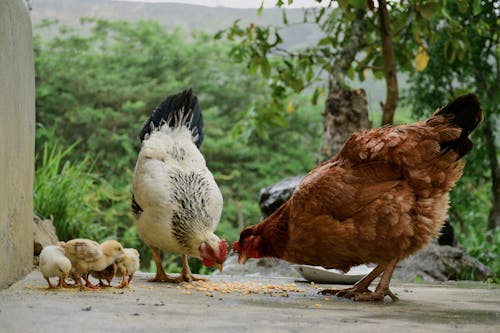
While wet cat food will contain about 10-15% of protein, dry cat fat is likely to contain up to 28% of protein.
The truth is that you can feed your birds whatever form of cat food you want. Some owners lean more towards dry cat food because its cheaper, lasts longer, and contains more protein.
Others think the moisture in wet cat food will provide better hydration than dry cat food possibly can. Again, its a matter of choice.
Your chickens may end up falling in love with either, both, or none of them. Whats more important is how much serving of cat food you feed them.
Considering the protein content for dry cat food, for instance, itll be ideal to serve your chickens with smaller portions when contrasted with wet cat food.
through what means should i feed my chickens cat food?
You can feed your chickens directly with cat food.
With dry cat food especially, you can mix that up with the main diet of the birds. These pellets should be small enough for your birds to pick up. But, where theyre unusually larger, you might want to break them into smaller pieces when mixing with chicken feed.
Additionally, you may blend it into powdered form for your chickens.
how much cat food should i feed my chickens?
Chicken feed, not cat food, should remain the staple in your chickens diet. As such, cat food should just operate as a treat.
In chickendom, it is generally believed that 90% of a chickens diet should be met by well-balanced chicken feed. The other 10% can be supplemented with scratch grains, table scraps, and treats.
Cat food falls under this category. Practically, you dont want to give your chickens more than 2 tablespoons of cat food every day.
how often should i give my chickens cat food?
Like all other treats, cat food should be fed in moderation or occasionally. Of course, if youre applying the 90/10 rule above, it may make sense to feed your chickens with cat food every day.
As long as youre not exceeding 10%, theres little chance that your chickens will be overfed with excess protein.
However, the best time to feed your chickens with cat food is when theyre molting. Feathers contain about 80 to 85% of protein.
So, during this period, theyll need extra amounts of protein to help in regrowing new feathers. And you can make the process more seamless for your birds by incorporating protein-rich cat food into their diet.
Since itd just be to supplement their main diet, you shouldnt feed them with more than four tablespoons of cat food in a day.
Final thoughts
One reason we love chickens so much is that theyre easy to feed and take care of. If something is edible and they like it, then its game! Thats chicken for you.
But, it doesnt mean its safe for them simply because they can eat it. So, can chickens eat cat food? Absolutely! But, its not something you want replacing their main diet.
Theyll likely fall in love with it and beg you for it once they do. However, you dont want to give them too much too soon. The high protein levels in cat food might be detrimental for them.
Follow the 90/10 rule. And you may take it up a notch when theyre molting. If youre wondering what healthy alternative treats to feed your chickens, find out here.
Sharing is caring!

